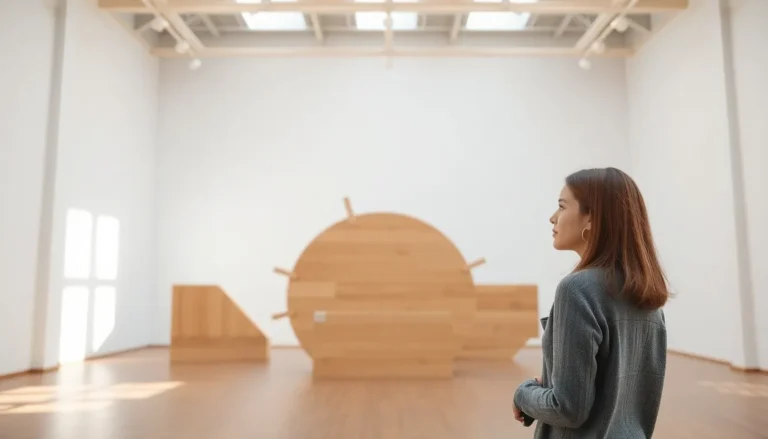Table of Contents
ToggleIn a world overflowing with stuff, conscious decluttering isn’t just a trend; it’s a lifestyle choice that can transform chaos into calm. Imagine waking up to a serene space where every item sparks joy instead of anxiety. It’s like giving your home a refreshing spa day—minus the cucumbers on your eyes.
What Is Conscious Decluttering?
Conscious decluttering involves intentional decision-making regarding possessions. This process focuses on eliminating items that no longer serve a purpose or contribute to overall happiness. It encourages individuals to assess their belongings critically, fostering a sense of mindfulness.
Practicing conscious decluttering creates a serene and joyful living space. Individuals recognize their relationship with belongings and prioritize items that enhance their quality of life. This assessment often includes reflecting on the emotional significance or utility of each item.
Many people approach this practice in stages. First, they categorize belongings into groups such as keep, donate, or discard. Next, they evaluate items within each category based on their emotional resonance and functional value. Striving for simplicity often leads to greater mental clarity and reduced stress.
Ways to engage in conscious decluttering include setting aside specific time slots for evaluation. Individuals can create a decluttering schedule outlining timeframes for each area of the home. One effective approach involves focusing on one room at a time, ensuring manageable progress and less overwhelming feelings.
Conscious decluttering also promotes eco-friendly behaviors. Donating or recycling unwanted items benefits the environment and supports local communities. Everyone enjoys a space that reflects personal values and contributes positively to well-being.
Ultimately, conscious decluttering represents a holistic lifestyle choice. It transforms living spaces into sanctuaries that align with individual values and desires, cultivating calmness and joy.
Benefits of Conscious Decluttering
Conscious decluttering offers numerous advantages that enhance both living spaces and individual experiences. This practice significantly contributes to mental and emotional well-being.
Mental Clarity
Gaining mental clarity often becomes a direct result of conscious decluttering. Removing excess possessions allows for a more organized environment. An organized space minimizes distractions and enables better focus on important tasks. Individuals frequently report improved decision-making skills as their mental load lightens. Clarity fosters productivity, creating a motivating atmosphere that supports personal and professional goals. Each item left in the space serves a purpose, leading to a simplified lifestyle that promotes peace of mind.
Emotional Well-being
Emotional well-being thrives in an environment free from clutter. Uncluttered spaces correlate with reduced anxiety and stress levels. Letting go of items that no longer spark joy can be cathartic, leading to feelings of liberation. Individuals often feel empowered as they make intentional decisions about their belongings. With increased emotional awareness, she or he connects with values and priorities in life. A serene living space nurtures happiness and inspires individuals to cultivate fulfilling relationships and experiences. Conscious decluttering truly creates a positive emotional impact on daily life.
Steps to Practice Conscious Decluttering
Conscious decluttering involves a structured approach to create a serene environment. Practicing it efficiently enhances well-being and fosters joy.
Assessing Your Space
Start by evaluating each area of your living space. Consider both visual clutter and items that take up physical space. Identify zones that feel overwhelming or chaotic. Next, dedicate time to examine belongings within each zone. Group items together, noting their condition and emotional significance. Use this opportunity to reflect on what truly adds value to your life. Each item holds a purpose, so prioritize based on joy and function. Assessing your space establishes a foundation for informed decluttering decisions.
Making Considered Decisions
Involve mindfulness while deciding what to keep or discard. Engage with each item, asking if it sparks joy or serves a practical function. When uncertainty arises, think about its emotional attachment or potential utility. Consider creating categories like keep, donate, or recycle for clarity. Decisions made with intention often lead to better outcomes, enhancing overall satisfaction. If it doesn’t align with your values or bring happiness, let it go. Prioritizing meaningful belongings transforms living spaces, cultivating an atmosphere that reflects personal values.
Tips for Maintaining a Clutter-Free Space
Maintaining a clutter-free space requires intentional strategies and consistent habits. Incorporating these tips can foster an organized and serene environment.
Regular Reflection
Regular reflection on personal belongings helps in maintaining clarity. Set aside time weekly or monthly to assess items. During this time, evaluate whether each item serves a purpose or sparks joy. Create a checklist for assessment, including questions like “Does this add value to my life?” or “Am I emotionally attached to this?” Consistently engaging in this practice prevents accumulation of unnecessary items. Embrace the mindset of quality over quantity; prioritize items that support overall happiness. This commitment to regular reflection cultivates a more mindful approach to possessions.
Mindful Consumption
Mindful consumption directly influences a clutter-free space. Before acquiring new items, consider their necessity and long-term value. Ask yourself if the potential purchase enhances your well-being or aligns with your values. Focus on acquiring high-quality, meaningful items rather than impulsively buying. By doing so, he or she reduces the likelihood of future clutter. Establishing a one-in-one-out policy keeps the space balanced; for every new item brought in, an old one must be removed. This conscious approach to consumption fosters a clutter-free lifestyle that resonates with personal prioritization and joy.
Embracing conscious decluttering transforms not just living spaces but also the mind and spirit. By intentionally evaluating possessions and prioritizing what truly matters, individuals can create serene environments that promote joy and clarity. This practice fosters a deeper connection with personal values and encourages a more mindful lifestyle.
Regularly reflecting on belongings and adopting sustainable habits ensures that clutter doesn’t return. As one simplifies their space, they often discover a newfound sense of freedom and empowerment. Conscious decluttering is more than a task; it’s a journey toward a more fulfilling and harmonious life.







